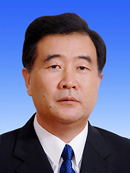Wang Yang 汪洋
Chair of CPPCC
1955
Chair of Chinese People’s Political Consultative Conference and nominally leads the Tibet Work Leading Group.

Overview
Pronunciation: Wong Yahng soundbite
Born: 1955
Education: Engineering Degree from University of Science and Technology
Career: Gained fame as Party chief in Chongqing for economic development, rational and humane response to protest and liberalization of control of media. Party Secretary of Guangdong Province until end 2012 where he had a similar approach, sometimes openly against Beijing policies.
Prospects: Missed out on promotion to the Politburo Standing Committee in 2012 but made the cut in 2017. Formally made Chair of the “advisory” body, the Chinese People’s Political Consultative Conference in March 2018.
Relevance to Tibet: Technically in charge of the Tibet Work Leading Group, also called Central Tibet Work Coordinating Group, but Xi Jinping also likely involved.
Standing in the Party and Career Highlights:
Wang’s early political career was forged in the regional Communist Youth League, in Anhui Province. At the age of 38, he was appointed executive vice governor of Anhui Province, holding the post for six years, until 1999 when we was transferred to Beijing as Vice Minister of the National Reform and Development Commission (1999–2003) and deputy Secretary-General of the State Council (2003–05). He served as Party Secretary of Chongqing from 2005 to 2007 and Party Secretary of Guangdong until 2012 (when he was replaced by Hu Chunhua). From 2012 – 2017 served as one of 4 Vice Premiers (portfolio unclear).
With his strong CCYL ties, Wang was considered an ally of Hu Jintao. Cheng Li reported that some PRC journalists have claimed that it was Deng Xiaoping who “found” Wang Yang in 1992 when he was mayor of Tongling City. Deng was quoted as saying: “Wang Yang is an exceptional talent.”
Wang’s prospects for promotion in 2012 were always uncertain and the South China Morning Post accurately predicted that he would have to wait until 2017. Wang was often portrayed as a rival of Bo Xilai, but Cheng Li said “Bo’s downfall does not necessarily mean an absolute victory for Wang”, and his links to Hu Jintao may have worked against him.
Nicknamed “The Young Marshal” according to Willy Lam, Wang Yang appears to have one of the strongest reputations as a reformer among senior leaders. Cheng Li lists Wang’s hot-button issues as including; the transformation of China’s economy from an export-driven one reliant on cheap labor to an innovation-led model driven by domestic consumption; the promotion of intra-party democracy and village elections; media transparency; and bolder political reforms.
In connection to the protests that flared in 2011 in the Guangdong village of Wukan, Wang was reported to have said “‘People’s democratic awareness is increasing significantly in this changing society. When their appeals for rights aren’t getting enough attention, that’s when mass incidents happen.” The Sydney Morning Herald reported that after 10,000 Wukan residents ejected the corrupt local Communist Party leadership, Mr Wang organised elections to change the leaders rather than send in the armed police.
The SMH also quoted Wang as telling the National People’s Congress in March 2012, “To solve the problem of vested interest groups holding up reform, we must first perform surgery on the party and the government.” Read More.
However Mimi Lau, writing in the South China Morning Post in June 2012, said that the Post had “learned that an order issued in recent months threatened that heads would roll if Guangdong witnessed a second Wukan or similar “unpredicted” mass incident before the 18th Party Congress. Local government officials and public security officers were told they would be held responsible if they failed to do their utmost to nip protests in the bud. While it cannot be confirmed that the order came from Wang himself, many find it highly believable.” The SCMP quoted Ye Du, a Guangzhou-based media analyst as saying the efforts included “tighter control of the local media and more petitioners being arrested.”
Wang Yang’s Contact Information:
- Address: State Council Information Office. No.225 Changyangmennei Dajie, Dongcheng District, Beijing, 100010.
- Website: www.scio.gov.cn
- Phone: + 86 10 8652 1199
- Fax: + 86 10 6559 2364
Printing this Page
For best results when printing this page, adjust your print settings by unchecking “print background colours” and “print background images”.
